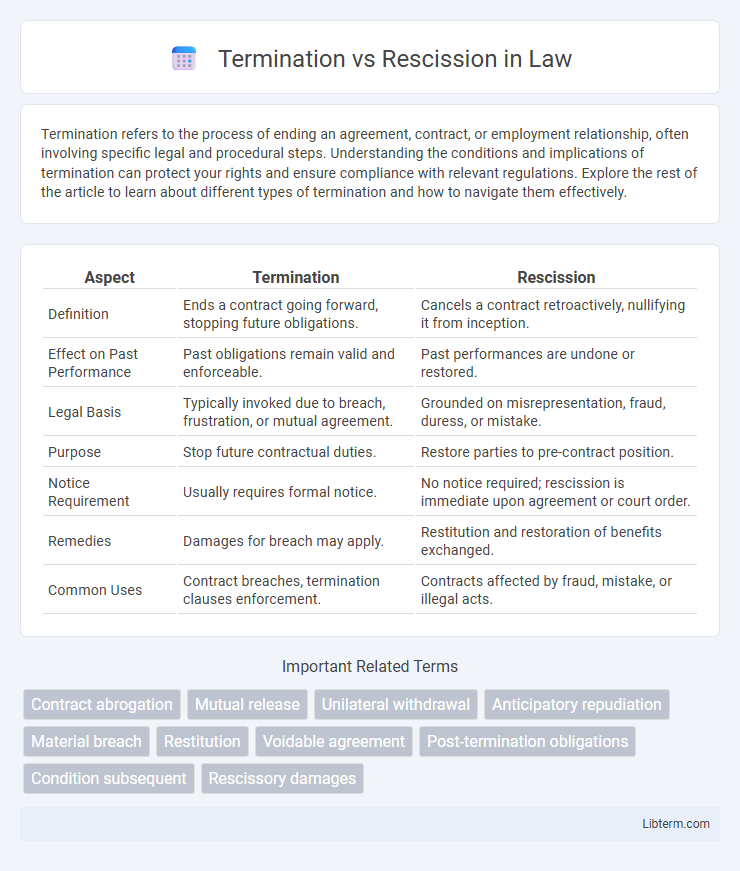Termination refers to the process of ending an agreement, contract, or employment relationship, often involving specific legal and procedural steps. Understanding the conditions and implications of termination can protect your rights and ensure compliance with relevant regulations. Explore the rest of the article to learn about different types of termination and how to navigate them effectively.
Table of Comparison
| Aspect | Termination | Rescission |
|---|---|---|
| Definition | Ends a contract going forward, stopping future obligations. | Cancels a contract retroactively, nullifying it from inception. |
| Effect on Past Performance | Past obligations remain valid and enforceable. | Past performances are undone or restored. |
| Legal Basis | Typically invoked due to breach, frustration, or mutual agreement. | Grounded on misrepresentation, fraud, duress, or mistake. |
| Purpose | Stop future contractual duties. | Restore parties to pre-contract position. |
| Notice Requirement | Usually requires formal notice. | No notice required; rescission is immediate upon agreement or court order. |
| Remedies | Damages for breach may apply. | Restitution and restoration of benefits exchanged. |
| Common Uses | Contract breaches, termination clauses enforcement. | Contracts affected by fraud, mistake, or illegal acts. |
Understanding Termination and Rescission
Termination ends a contract's obligations due to breach or mutual agreement, preventing future performance but generally preserving rights accrued before termination. Rescission voids a contract from its inception, treating it as if it never existed, typically due to fraud, misrepresentation, or mutual mistake, thereby restoring parties to their pre-contract positions. Understanding termination and rescission is crucial for enforcing or voiding agreements based on specific legal grounds and desired remedies.
Key Definitions: Termination vs Rescission
Termination refers to the ending of a contract from the point of termination onward, releasing parties from future obligations while leaving prior rights intact. Rescission, in contrast, voids the contract retroactively, treating it as if it never existed and restoring parties to their pre-contract positions. Key distinctions include termination's prospective effect versus rescission's retroactive nullification of contract validity.
Legal Frameworks Governing Termination
Termination involves ending a contract due to breach or agreed terms, governed by legal frameworks such as the Uniform Commercial Code (UCC) and common law principles that outline conditions for lawful cessation. Rescission, by contrast, nullifies a contract retroactively, often based on fraud, misrepresentation, or mutual mistake, and is regulated by equitable doctrines and statutory provisions. Legal frameworks for termination emphasize enforceable rights and remedies to prevent unjustified contract dissolution.
Legal Frameworks Governing Rescission
Legal frameworks governing rescission primarily derive from contract law principles, emphasizing the restoration of parties to their original positions as if the contract never existed. Courts often require a valid ground such as misrepresentation, fraud, mistake, duress, or undue influence to permit rescission, ensuring fairness and justice in contractual dealings. Statutory provisions like the Uniform Commercial Code (UCC) and common law doctrines provide specific rules on rescission, differentiating it clearly from termination, which ends a contract for future obligations without annulling past performances.
Common Grounds for Contract Termination
Common grounds for contract termination include breach of contract, mutual agreement, frustration of purpose, and impossibility of performance. Termination releases parties from future obligations but generally preserves rights accrued before termination. Rescission, on the other hand, voids the contract ab initio, treating it as if it never existed due to factors like fraud, misrepresentation, undue influence, or mutual mistake.
Common Grounds for Contract Rescission
Common grounds for contract rescission include mutual mistake, misrepresentation, fraud, duress, undue influence, and illegality. Rescission voids the contract from its inception, restoring parties to their pre-contractual positions, unlike termination which ends the contract's future obligations. Courts frequently grant rescission when consent was impaired or the contract's validity is compromised by these fundamental flaws.
Effects and Consequences of Termination
Termination ends the contractual obligations of all parties from the point of termination forward, releasing them from future performance but not affecting rights or liabilities accrued before termination. It generally does not undo the contract's past effects, so any benefits or damages incurred remain enforceable. Unlike rescission, termination does not restore parties to their original positions but merely stops further duties under the contract.
Effects and Consequences of Rescission
Rescission nullifies the contract, restoring parties to their pre-contractual positions and eliminating all obligations as if the agreement never existed. Unlike termination, which ends the contract prospectively but leaves past performance intact, rescission retroactively voids all contract effects, often requiring restitution of benefits exchanged. This remedy can lead to the return of property, reversal of payments, and cancellation of ongoing duties, emphasizing its corrective impact on contractual relations.
Real-World Examples: Termination vs Rescission
Termination occurs when a contract is ended due to breach or mutual agreement, as seen in a construction project halted for failure to meet deadlines. Rescission voids a contract from inception, such as when a buyer cancels a property purchase after discovering fraudulent disclosures. Real-world cases highlight termination as stopping ongoing obligations, while rescission eliminates the contract entirely as if it never existed.
Choosing the Right Remedy: Termination or Rescission
Choosing the right remedy between termination and rescission depends on the contract's breach severity and desired outcome. Termination ends future obligations while preserving accrued rights, ideal for ongoing contracts where parties no longer wish to continue. Rescission voids the contract retroactively, restoring parties to their pre-contract positions, suitable when a contract is voidable due to misrepresentation or fraud.
Termination Infographic

 libterm.com
libterm.com